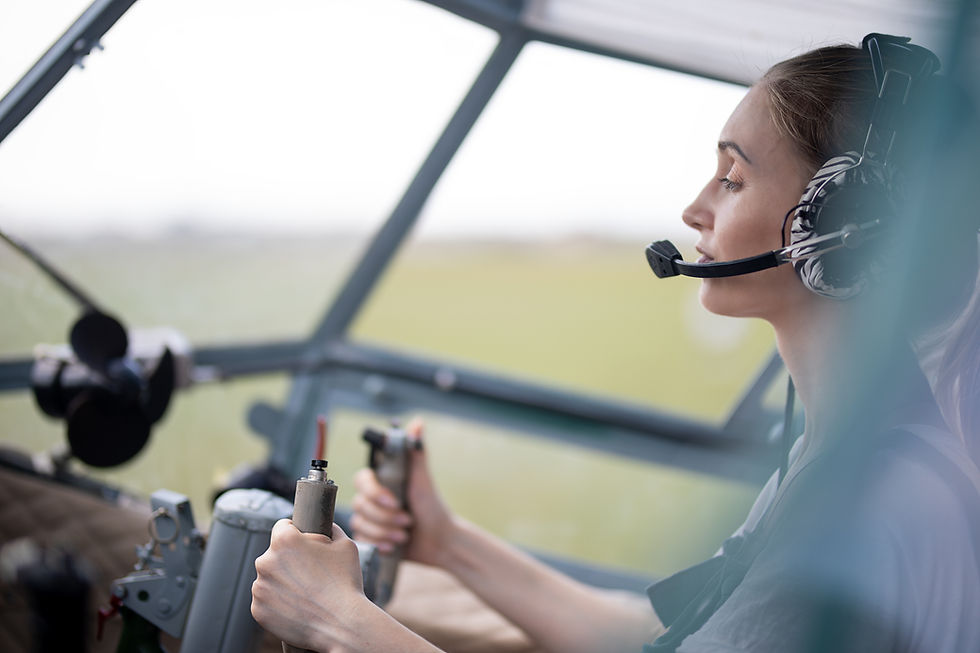Navigating Psychological Challenges in Indian Aviation: Examining Staff Well-being
- Dr Ashutosh Srivastava

- Nov 18, 2023
- 3 min read
The world of aviation, with its high-stakes operations and split-second decision-making, often neglects the psychological well-being of its dedicated staff. This article aims to provide a deeper understanding of the challenges faced by aviation professionals in India, shedding light on the intricacies of their mental health. Embarking on a journey through the clouds, this blog aims to uncover the silent struggles behind the cockpit doors and within the control towers. From the erratic work hours that disrupt sleep patterns and induce chronic fatigue to the stress-laden atmosphere where split-second decisions shape destinies, we unravel the multifaceted challenges faced by pilots, air traffic controllers, and ground staff.
In a culture where mental health remains a whispered concern, we navigate the stigma hindering open discussions and delve into the absence of dedicated support structures within the industry. Loneliness amidst transient connections, hierarchical barriers to communication, and the potential post-traumatic stress from critical incidents form the landscape of challenges awaiting exploration.
Join us as we navigate the psychological turbulence within the aviation sector, advocating for a comprehensive approach to prioritize mental well-being. Together, we unveil the human side of flight, acknowledging the importance of a mentally resilient workforce in the relentless pursuit of safe and efficient skies.

Erratic Work Hours and Fatigue: The irregular work hours inherent in the aviation industry significantly impact the well-being of its staff. Pilots, cabin crew, and ground staff grapple with unpredictable shifts, leading to challenges such as jet lag and chronic fatigue. Beyond the physical exhaustion, irregular schedules take a toll on cognitive functions and decision-making abilities, emphasizing the need for strategies to manage these challenges effectively.
Stress and Performance Pressure: The high-stakes nature of aviation, coupled with the tremendous responsibility for passenger safety, creates an inherently stressful environment. Pilots and air traffic controllers, as primary decision-makers, face constant pressure to maintain precision and attention to detail. This pressure, when not managed effectively, can result in stress-induced lapses, underscoring the delicate balance required for maintaining composure and ensuring safety in a demanding industry.
Lack of Mental Health Support: In India, pervasive stigma surrounding mental health prevents aviation staff from seeking the support they may desperately need. The absence of dedicated mental health support programs within the industry exacerbates this issue, creating a work environment where individuals are reluctant to address mental health concerns openly. To tackle this, comprehensive support structures are essential to foster an atmosphere that encourages open discussions about mental well-being.
Isolation and Loneliness: Pilots and cabin crew members often endure extended periods away from home, leading to heightened feelings of isolation and loneliness. The transient nature of both personal and professional relationships exacerbates the mental health challenges faced by aviation professionals. To address this, industry stakeholders need to implement measures that recognize and alleviate the impact of isolation on overall well-being.
Cultural and Hierarchical Factors: The hierarchical structure within aviation poses challenges to open communication about psychological struggles. A culture of deference to authority within the industry may discourage subordinates from expressing concerns or seeking help. Breaking down these cultural barriers is crucial to creating an environment where mental health is prioritized, ensuring a more supportive and communicative workplace that actively addresses the needs of its staff.
Post-Traumatic Stress from Critical Incidents: Aviation staff often find themselves in the midst of critical incidents, ranging from emergencies to accidents. The psychological toll of witnessing or experiencing such events can lead to post-traumatic stress. Recognizing and addressing the potential long-term effects of critical incidents is essential for fostering resilience within the aviation workforce, ensuring that professionals can cope effectively with the unique challenges they may encounter.
Conclusion: To address the multifaceted challenges to psychological safety for aviation staff in India, a comprehensive approach is necessary. Industry stakeholders must not only prioritize mental health support but also implement effective fatigue management strategies and foster a culture of open communication. Recognizing the importance of mental health within the workforce is not only about individual well-being but is integral to sustained operational excellence and safety. As the aviation sector continues to evolve, proactive efforts to support the mental health of its professionals will contribute to a safer, more resilient industry that values the welfare of its personnel.




Comments